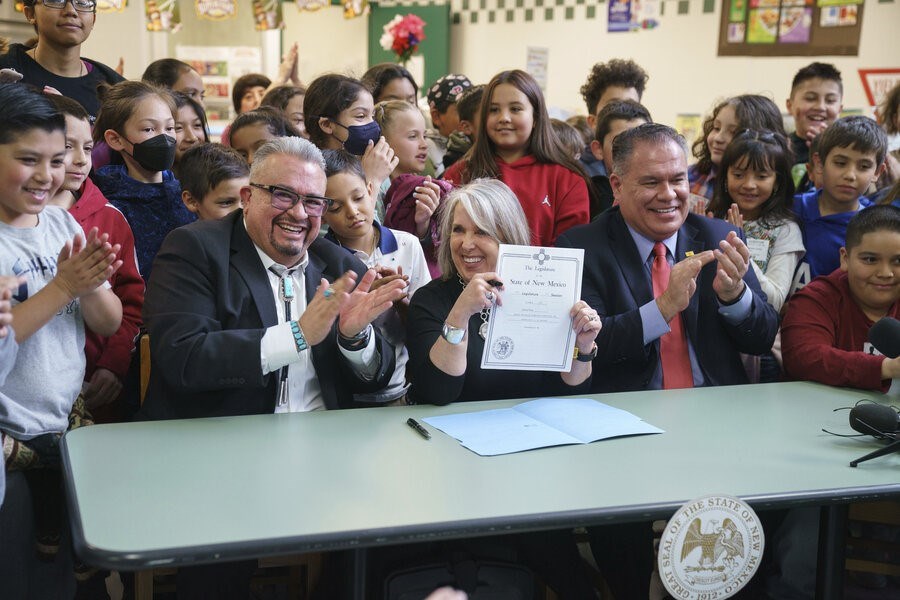REPRINTED WITH PERMISSION FROM THE CHRISTIAN SCIENCE MONITOR
 New Mexico Gov. Michelle Lujan Grisham is joined by two sponsors of the bill she signed at Pinon Elementary School in Santa Fe on March 27, 2023. The legislation provides free school meals for New Mexico students. David Lienemann/AP
New Mexico Gov. Michelle Lujan Grisham is joined by two sponsors of the bill she signed at Pinon Elementary School in Santa Fe on March 27, 2023. The legislation provides free school meals for New Mexico students. David Lienemann/AP
New Mexico Gov. Michelle Lujan Grisham has signed a bill to provide free school meals to all students, setting aside more than $22 million to fund the program. The legislation aims to combat food insecurity rates, boost local agriculture, and reduce food waste.
Gov. Michelle Lujan Grisham on Monday signed legislation to provide free school meals to all students regardless of family income, as New Mexico and several other states look to fill the gap left by lapsed federal pandemic-era benefit programs and address the strain family budgets caused by food prices.
The bill cleared the legislature during the recent 60-day session, with lawmakers setting aside more than $22 million in the state budget to help pay for the program. Additional money will be used to improve school kitchens so healthier meals can be prepared.
“When we feed our children, we’re feeding our future – these investments today will yield benefits tomorrow through generations of healthier New Mexicans,” the Democratic governor said in a statement issued after she celebrated with dozens of elementary school students.
California and Maine have made universal meals permanent, legislation to do so is advancing in Vermont, and Nevada pitched in $75 million to extend free school meals for this school year. In Colorado, voters approved a ballot measure last fall giving school districts the opportunity to offer free lunches.
Nationally, debts for unpaid school meals have been rising, indicating the need to continue providing free meals to ensure students are able to concentrate in the classroom. A recent report issued by the Food Research & Action Center showed participation in school breakfast and lunch programs was higher during the last school year than that at pre-pandemic levels.
About 67% – or 309,000 New Mexico students – are eligible to receive free and reduced-price lunches through the National School Lunch Program, according to the New Mexico Public Education Department.
The signing of the legislation could impact nearly 70,000 students who normally would have had to pay for school meals, with department officials expecting a 5% to 10% increase in participation in districts that operate national school lunch programs.
Ms. Lujan Grisham included the proposal in her State of the State address, saying that wherever kids are, there ought to be a kitchen working to keep them healthy, strong, and ready to learn.
Still, some say more money will be needed to bankroll the effort over time. This year, New Mexico was awash in new revenue due in part to a financial windfall from oil production.
Legislative analysts have estimated that providing meals at no cost to students at participating schools could total between $27 million and $40 million in recurring funding from the state’s general fund.
Advocacy groups see universal free school meals as the next step in New Mexico’s march toward combating historically high food insecurity rates in a state that has long struggled with generational poverty. Other recent efforts include legislation in 2020 that eliminated student co-pays for reduced-price school meals and a 2017 measure that made New Mexico the first state in the U.S. to ensure children can’t be humiliated by school meal debts.
The new law aims to boost the amount of food that comes from local growers through farm-to-table grants. Currently, about 168 farmers, ranchers, and food businesses sell locally produced products to schools in 19 of the state’s 33 counties.
Supporters also hope the new law will lead to less food waste by requiring kindergarten through sixth grade students to have more time to sit down and eat, and by collecting unused food for use by food pantries, students, and other charitable organizations.
This story was reported by The Associated Press.
Page created on 4/5/2023 4:32:10 PM
Last edited 4/5/2023 4:40:24 PM
